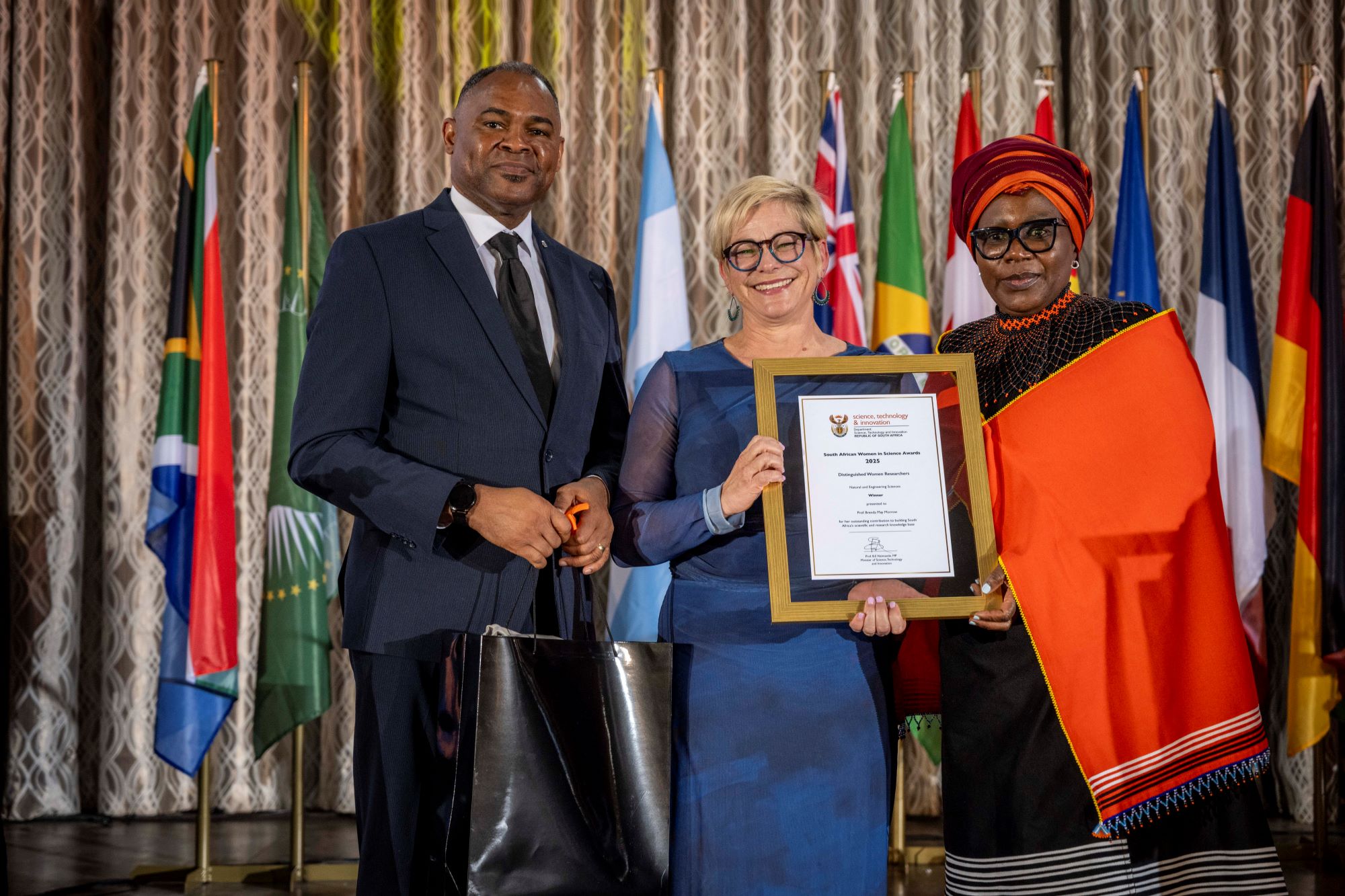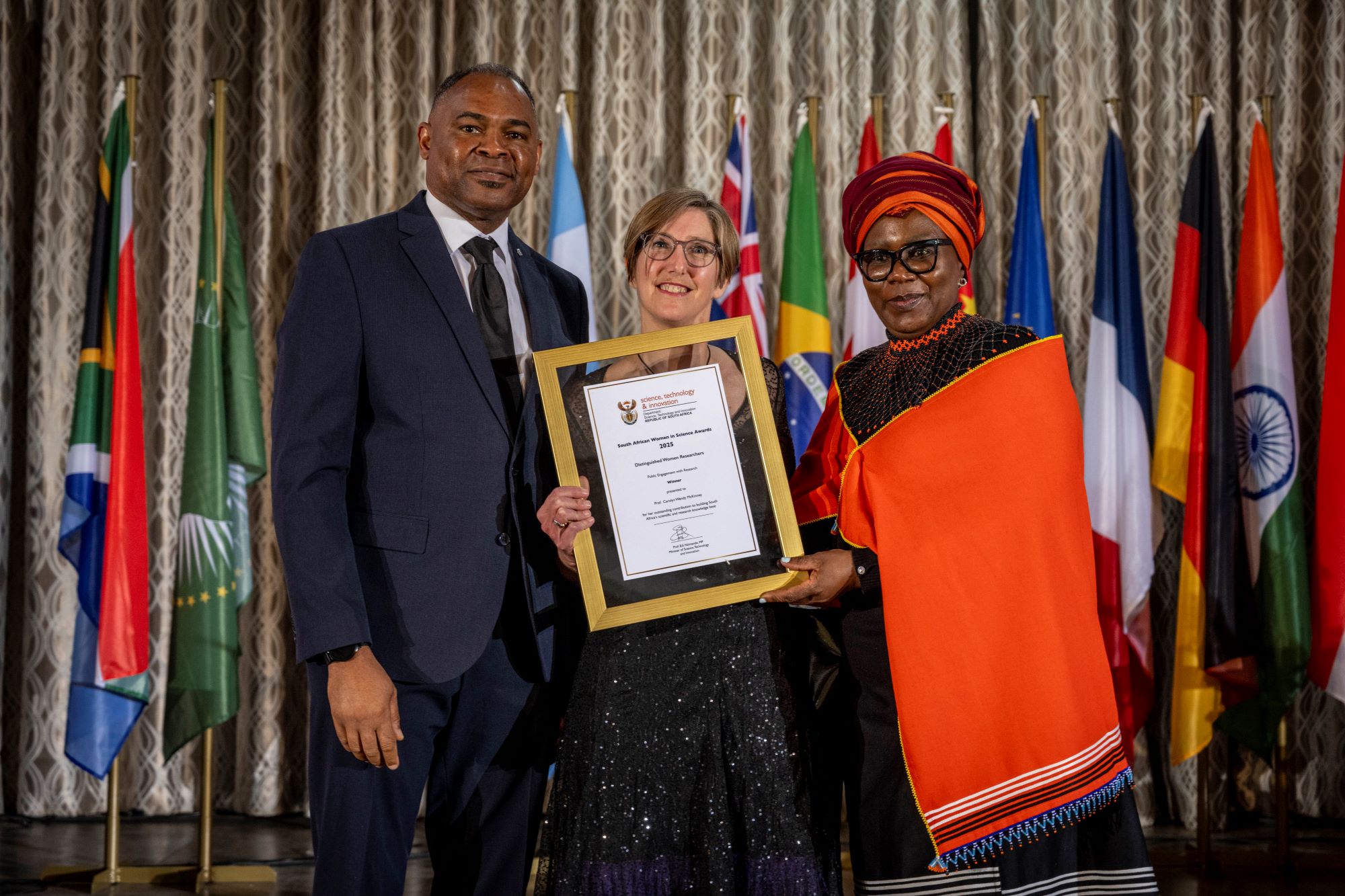UCT academics shine at SA Women in Science Awards
29 August 2025 | Story Ayanda Mthethwa. Photo SAWiSA. Read time 6 min..jpg)
Trailblazing women from the University of Cape Town (UCT) walked away with prestigious honours at the 2025 South African Women in Science Awards (SAWiSA), where the Department of Science, Technology and Innovation (DSTI) celebrated the country’s leading and emerging women researchers in Bloemfontein, Free State, on 21 August.
SAWiSA is the country’s annual celebration of women leading in science, technology, engineering and mathematics (STEM), as well as the Humanities and Social Sciences. Each year, the awards recognise women whose work in academia is shaping both national and global knowledge landscapes.
The 2025 ceremony was hosted under the theme “Unpacking STEM careers: Her voice in science”, which aligned with the United Nations Educational, Scientific and Cultural Organization’s (UNESCO) 2025 International Day of Women and Girls in Science call to promote diversity and inclusivity in STEM fields. To broaden national visibility, the event is held in a different province each year.
This year, 30 remarkable women across various fields made it to the finals, with UCT’s Professors Carolyn McKinney and Brenda Morrow both earning Distinguished Women Researcher Awards.
Championing child health
Professor Morrow’s accolade was in recognition of her work in the natural and engineering sciences. She is an internationally renowned clinician scientist in paediatrics and child health and ranked 18th globally in the field of paediatric critical care research. Her research is translational and interdisciplinary, spanning paediatric critical care, cardiopulmonary rehabilitation, cystic fibrosis and medical ethics – with a strong emphasis on equity in resource-limited settings.

Morrow’s pioneering work in paediatric cardiopulmonary physiotherapy, particularly her groundbreaking studies on regional ventilation in children, has influenced practice well beyond South Africa, and shaped international standards in child healthcare. Her research and advocacy focus on measures to reduce the burden of severe childhood illnesses through enhancing interdisciplinary approaches to prevention, awareness and healthcare.
Giving voice to multilingual classrooms
Professor McKinney’s recognition was for her influential research on colonial language ideologies and her devotion to public engagement. Her work interrogates the concept of Anglonormativity – the privileging of monolingual English in educational settings – and pioneered decolonial approaches to bilingual and multilingual language and literacy education.

Her research has directly influenced inclusive language policy development in South African schools and underpinned the Department of Basic Education’s rollout of Mother Tongue-Based Bilingual Education (MTBBE). Despite facing challenges of limited national capacity and funding, McKinney and colleagues from the Bua-Lit language and literacy collective have made research accessible through novel public engagement tools, including a widely circulated pamphlet series and a free online course that attracted more than 3 000 participants within its first month.
Supporting women researchers and creating conditions for them to thrive is an important focus of the university.
Support for women researchers at UCT
UCT is committed to increasing its number of active women researchers as they are critical to the future of the university, the country and research. The university focuses on extending opportunities such as the Emerging Researcher Programme for early-career academics to women, who as of 2025 made up 146 of the 247 members of the programme.
Dr Linda Mtwisha, the executive director: research, described the recognition of UCT’s women researchers at SAWiSA as both inspiring and deeply rewarding: “Supporting women researchers and creating conditions for them to thrive is an important focus of the university,” she said.
“To see them celebrated on a national stage reflects not only their individual excellence, but also the collective progress we are making towards a more inclusive research environment. It’s a moment of immense pride and a source of inspiration for the next generation of women scholars,” she added.
UCT runners-up
Of the eight UCT finalists, four were recognised as runners-up:
- Associate Professor Victoria (Tory) Madden, from the Department of Anaesthesia and Perioperative Medicine and director of the African Pain Research Initiative (APRI) at the Neuroscience Institute, was first runner-up in the distinguished young women researchers (natural and engineering sciences) category. Her research explores how pain emerges and persists after tissue healing, including in complex contexts such as HIV.
- Associate Professor Jess Auerbach Jahajeeah, also a first runner-up in the distinguished young women researchers (human and social sciences) category, was recognised for pioneering the field of knowledge mobilities. Her research examines the intersection of knowledge systems and infrastructure, particularly how fibre optic cables, human decisions, language and global systems interact.
- Professor Shanaaz Mathews, second runner-up in the distinguished women researchers (human and social sciences) category, was recognised for her work in developing and scaling effective strategies to prevent violence against women and children, while addressing the complexity of this social challenge.
- Professor Alison September, second runner-up in the distinguished women researchers (natural and engineering sciences) category, is an internationally recognised academic leader in physiological sciences. Her pioneering research, mentorship and leadership in sports and exercise genomics, including groundbreaking work on the genetics of musculoskeletal injuries such as anterior cruciate ligament (ACL) injuries, has positioned UCT as a global leader in this field.
The work of our academics is at the coalface of knowledge generation and application.
Professor Jeff Murugan, UCT’s acting deputy vice-chancellor: research and internationalisation, highlighted the wider significance of these awards, adding “they are a testament to the extraordinary talent of women researchers at UCT”.
“The work of our academics is at the coalface of knowledge generation and application. It is truly transforming lives in South Africa and has great influence in global contexts. We are proud of their accolades and are resolute on continuing to create an environment where women in research can thrive and lead the charge.”
A nod to the next generation of researchers
Two UCT postgraduates were also presented with master’s and doctoral fellowships:
Samantha Filby: A final-year PhD candidate in the School of Economics at UCT was presented with the DSTI-Dr Ivy Matsepe-Casaburri Fellowship. Her PhD research investigates how young people in African countries respond to cigarette price increases driven by taxes. She’s also examining the impact of international tax policy benchmarks on smoking behaviour and assesses the public health implications of alternative cigarette excise tax structures.
Phelisa Ntayiya: A final-year master’s student in Biomedical Engineering, was presented with a DSTI-Dr Ivy Matsepe-Casaburri Master’s Fellowship. Her research focuses on improving the clarity of visual data from cystoscopy procedures, which are used to detect bladder tumours and cancers. She is developing a wireless camera system that can automatically correct image distortions in real time, to give doctors a sharper and more accurate view during examinations
 This work is licensed under a Creative Commons Attribution-NoDerivatives 4.0 International License.
This work is licensed under a Creative Commons Attribution-NoDerivatives 4.0 International License.
Please view the republishing articles page for more information.
















